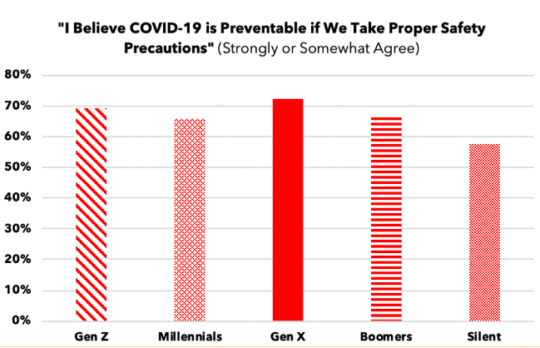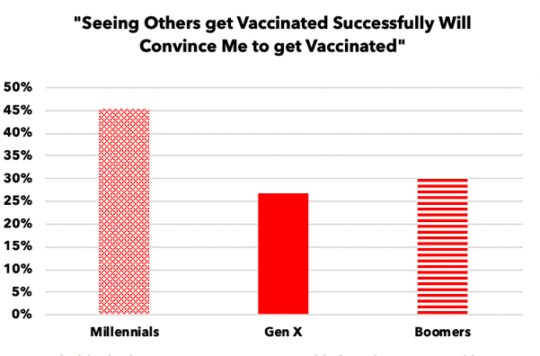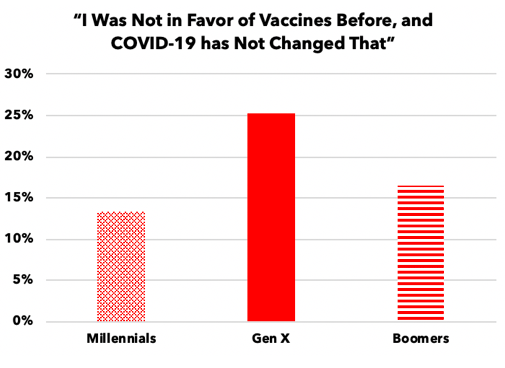The Generations Finally Agree on Something: COVID-19 Sucks!
Now What do We All Want to do About it?
By Dean Browell, Alan Shoebridge, and Dan Miers
January 24, 2021
It’s not surprising that the generations all share a strong dislike for COVID-19. Yet, within that high level of broad agreement, distinct attitudes and patterns emerge: how to stay safe, whether to get vaccinated, who to trust most, and other related topics reveal areas of alignment and disagreement between baby boomers, Gen Xers, and millennials.
![]() Dan: Recently, our good friend and colleague Rob Klein conducted the 4th wave of his National Omnibus Study examining consumer attitudes and behaviors in this time of COVID. It’s an insight-rich report and, if you haven’t, you should talk to Rob (rob@kleinandpartners.com) about what the research shows.
Dan: Recently, our good friend and colleague Rob Klein conducted the 4th wave of his National Omnibus Study examining consumer attitudes and behaviors in this time of COVID. It’s an insight-rich report and, if you haven’t, you should talk to Rob (rob@kleinandpartners.com) about what the research shows.
In this wave, Rob surveyed 750 respondents nationally, with millennials (28%), Gen Xers (27%) and boomers (32%) accounting for 87% of the sample.
At Don’t You Forget About Gen X, we’re always interested in seeing how different generations think, feel, and act. It’s useful confirmation when we see previous findings play out in current behavior. New data enriches our understanding of generations and helps see them in a more refined light. Rob was kind enough to share his research data sliced by the different generations. So, we thought we’d spotlight just a few findings that caught our eye.
The National Mood: Is it Blue Monday, or are We Walking on Sunshine?
Here, the survey has mostly good news to report. It asked respondents to rate a range of positive and negative emotions across a 10-point scale from “Very High” to “Very Low”. Overall, “Hope” is the emotion most likely to get a top-2 box score. Leading this (uncharacteristic?) positivity are Gen Xers, followed very closely by boomers, who were most likely to give “Hope” a top-2 box score. For millennials, “Optimism” was most likely to receive a top-2 box score, while Gen Z swung to the opposite end of the spectrum, rating “Anxiety” as their most likely top-2 box emotion.
What the different generations identified as their least likely top-2 box emotions is also very informative—for millennials it is “Fear,” for Gen Xers it is “Anger,” and for boomers it is “Loneliness.”
While it is great to see that people overall, and Gen Xers in particular, are feeling hopeful, when the survey digs a little deeper into people’s pressing health concerns and feelings, useful insights emerge. When asked to evaluate a battery of COVID-related issues on that same 10-point, “Very High” to “Very Low” scale, the unease that “COVID-19 is continuing to get worse” leads in top-2 box responses. Boomers are, by far, most concerned that COVID is getting worse. Gen Xers, like all of their generational counterparts, place this concern in their top-2 boxes more often than any other worry. Second for Gen Xers is “Concern that the vaccine may not be safe,” followed by a lingering fear that “[I] might get COVID.” In fact, Gen X is more concerned about getting COVID than any other generation. Among the study sample, Gen Z and millennials are more likely to have had COVID themselves or had a member of their family or household contract the virus than Gen Xers and boomers.
![]() Dean: I think this resonates with everything else we know about Gen X: practical, skeptical, and a desire for due diligence. This is the perfect recipe for fear and caution in times like these, as we work to make informed decisions, often in a vacuum. Those feelings can take many forms—from protective to productive—and it will mean we won’t always have uniform reactions. But we will be synced up in terms of worry.
Dean: I think this resonates with everything else we know about Gen X: practical, skeptical, and a desire for due diligence. This is the perfect recipe for fear and caution in times like these, as we work to make informed decisions, often in a vacuum. Those feelings can take many forms—from protective to productive—and it will mean we won’t always have uniform reactions. But we will be synced up in terms of worry.
Alan: A possible connection to hope here is that we have been given an outline to get through this: hunker down, avoid others, wear a mask, get vac![]() cinated, and get back to normal. Gen X knows that can be done, and we feel hopeful about the future. Also, we’re too busy to get COVID, so let’s just get past this and move on.
cinated, and get back to normal. Gen X knows that can be done, and we feel hopeful about the future. Also, we’re too busy to get COVID, so let’s just get past this and move on.
Healthcare Behaviors and the Lasting Effects of Care, Interrupted
Dan: Another interesting area examined in the study is the longer-term effect on health care “seeking” behaviors born of necessity in COVID. Nowadays, it’s quite common to hear, “the Telehealth Genie is out of the bottle.” Yes, it is—of course it is. What we find particularly intriguing are the details around specific e-care technologies and what different generations have to say about interest in their continued use—and what these attitudes reveal and confirm about the ![]() generations.
generations.
For instance, the study piercingly asks, “Whether you have used the following care settings or not, how likely are you to use any of them after the COVID-19 pandemic is over?” Gen Xers (48.3%), more than any other generation, say they will “Definitely Use” a “Virtual visit with your doctor or other health care professional.” The number two “Definitely will Use” e-care tool for Gen Xers is “Email your doctor” (47.5%) which, interestingly, is significantly higher than “Email a nurse” (39.3%). Third for Gen Xers is “Text your doctor,” followed by “Live text or chat on a website.”
Particularly indicative of how Gen Xers are wired, “Use a symptom checker with a Chat Bot before talking with a doctor” scores well below all other e-care options on “Definitely will Use” responses. This seems to suggest Gen Xers will embrace e-care options, but they want human interaction. They want engagement. They will not risk wasting time negotiating with AI when what they want is to personally connect with their trusted source.
![]() Dean: On the most basic level, if this pandemic has given Gen X anything, it’s a new set of tools for their tool box. And, if there’s one thing we know, it’s that once we have a tool, we’re going to use it. But remember, Gen X isn’t just using these tools for themselves, but for the whole of their “triple threat” status: as parents and in taking care of their own elderly parents. As they make healthcare decisions they are going to know what constitutes a visit that could be held online, they know what options they can—or should—expect. Perhaps the genie out of the bottle is the further empowered Gen Xer.
Dean: On the most basic level, if this pandemic has given Gen X anything, it’s a new set of tools for their tool box. And, if there’s one thing we know, it’s that once we have a tool, we’re going to use it. But remember, Gen X isn’t just using these tools for themselves, but for the whole of their “triple threat” status: as parents and in taking care of their own elderly parents. As they make healthcare decisions they are going to know what constitutes a visit that could be held online, they know what options they can—or should—expect. Perhaps the genie out of the bottle is the further empowered Gen Xer.
Alan: One consistent theme of our book is that once Gen Xers feel like something works—and we trust it—we’ll stick with it. As Dean points out, Gen X is ![]() coordinating care for multiple generations at one time. Adding tools that make it easier to do that, especially during COVID, is something that just makes sense.
coordinating care for multiple generations at one time. Adding tools that make it easier to do that, especially during COVID, is something that just makes sense.
The Generations and Vaccines: More a Shot to the Heart than in the Arm?
Dan: When asked about vaccines, Gen Xers’ usual skepticism and hunger for reassuring proof reveal themselves again.
First, it appears Gen Xers have completely embraced the preventive power of wearing masks and social distancing. They are more likely than any other generation to strongly agree with the statement “I believe COVID-19 is preventable if we take proper safety precautions.”
Overall, 60% of Gen Xers surveyed agreed they are “very” or “somewhat” likely to get a COVID vaccine for themselves when it is available (vs. 60% for millennials, 76% for boomers). For Gen Xers, potential side effects and vaccine effectiveness top their concerns. More than any other generation and concern listed in the survey, Gen Xers strongly agree with the statement “We are rushing the COVID-19 vaccine, so I am concerned about possible side effects.”
Compared to their millennial and boomer counterparts, Gen Xers are less likely to say their PCP getting the vaccine would make them feel comfortable getting the vaccine themselves (23.4% strongly agree vs. 24.6% of millennials and 29.9% of boomers).
Gen Xers just seem to be a particularly difficult nut to crack. For millennials and boomers, seeing others get the vaccine and have it work for them will, more than anything else, convince them to get it for themselves. While this is also Gen X’s top motivator, it lags behind the other generations.
Perhaps Dr. Fauci holds the key, as Gen Xers are more likely to be motivated by seeing that “Independent prominent researchers have studied it and verified that it works” (22.3% of Gen Xers agree, compared to 19.4% of millennials and 15.4% of boomers).
In fact, Dr. Fauci ranks right up there with “My primary care physician” as the person Gen Xers trust most to provide accurate information about the vaccine (25.7% for PCPs, 24.5% for Dr. Fauci). Of note, “My preferred hospital/health system” ranks among the lowest sources of trusted information (2.2% of Gen ![]() Xers trust them most, compared to 5.6% of millennials and 6.1% of boomers). Gen Xers trust their health plan (3.1%) and the federal government (4.9% more!
Xers trust them most, compared to 5.6% of millennials and 6.1% of boomers). Gen Xers trust their health plan (3.1%) and the federal government (4.9% more!
While Gen Xers may or may not have given birth to the Anti-vax movement, one of our own, Jenny McCarthy, sure did bring a lot of attention to it. So, it’s really no surprise that Gen Xers are also the generation most likely to strongly agree with the statement “Vaccines are a personal choice, and I respect those who choose not to get vaccinated,” and agree less that “Everyone should get vaccines that become available for different medical conditions.” Among Gen X there is an element of stubbornness—more than any other generation, Gen Xers agree, “I was not in favor of vaccines before, and COVID-19 has not changed that.”
So, How do We Make Our Way to Pleasantville?
![]() Dean: One of the most important takeaways is how Gen Xers’ confluence of skepticism and trust affects our reaction to situations like this. Note that for every suspicion of vaccines, there’s trust in a figure like Fauci. A similarly important insight: we’re just not all alike. Having some of the same decision-making perspectives doesn’t mean we’ll reach the same conclusions. There is no such thing as a homogenous generation, and it’s dangerous to count on that in your marketing. But you can count on similar approaches and attitudes, and that’s where Rob Klein’s research really helps us correlate how Gen X came to these conclusions—and why it’s worth noting how we’ll approach this important generation to change minds or validate directions.
Dean: One of the most important takeaways is how Gen Xers’ confluence of skepticism and trust affects our reaction to situations like this. Note that for every suspicion of vaccines, there’s trust in a figure like Fauci. A similarly important insight: we’re just not all alike. Having some of the same decision-making perspectives doesn’t mean we’ll reach the same conclusions. There is no such thing as a homogenous generation, and it’s dangerous to count on that in your marketing. But you can count on similar approaches and attitudes, and that’s where Rob Klein’s research really helps us correlate how Gen X came to these conclusions—and why it’s worth noting how we’ll approach this important generation to change minds or validate directions.
![]() Alan: As a marketer, I always appreciate data that can inform how I think about audiences. What’s clear here is that we need to really consider how our messages might be landing with various audiences. Since COVID-19 messages tend to be very broad and not as targeted as other marketing efforts, I would advocate using some proof points that appeal broadly and incorporating language that won’t alienate any of the generations. If you do have the opportunity to leverage a channel or tactic that targets a certain generation or life stage, then it is time to be very specific about what matters to them in your messaging.
Alan: As a marketer, I always appreciate data that can inform how I think about audiences. What’s clear here is that we need to really consider how our messages might be landing with various audiences. Since COVID-19 messages tend to be very broad and not as targeted as other marketing efforts, I would advocate using some proof points that appeal broadly and incorporating language that won’t alienate any of the generations. If you do have the opportunity to leverage a channel or tactic that targets a certain generation or life stage, then it is time to be very specific about what matters to them in your messaging.
Interested in learning more about Gen X's unique role in healthcare, and what that means for organizations and marketers? Download our eBook, Don't You Forget About Gen X: One Generation's Crucial Role in Healthcare here, check out our LinkedIn page for additional articles, podcasts, and events, and listen to our curated Gen X playlist.


